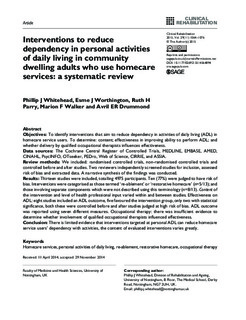| dc.contributor.author | Whitehead, P.J. | |
| dc.contributor.author | Worthington, E.J. | |
| dc.contributor.author | Parry, R.H. | |
| dc.contributor.author | Walker, M.F. | |
| dc.contributor.author | Drummond, A. | |
| dc.date.accessioned | 2017-06-07T12:37:52Z | |
| dc.date.available | 2017-06-07T12:37:52Z | |
| dc.date.issued | 2015 | |
| dc.identifier.citation | Whitehead, P.J., Worthington, E.J., Parry, R.H., Walker, M.F. & Drummond, A. (2015, Jan 13) Interventions to reduce dependency in personal activities of daily living in community dwelling adults who use homecare services: a systematic review. Clin Rehabil., 2015/01/15. | |
| dc.identifier.uri | http://hdl.handle.net/11250/2444979 | |
| dc.description | Systematisk oversiktsartikkel hverdagsrehabilitering. | |
| dc.description.abstract | Abstract Objectives: to identify interventions that aim to reduce dependency in activities of daily living (ADL) in homecare service users. To determine: content; effectiveness in improving ability to perform ADL; and whether delivery by qualified occupational therapists influences effectiveness. Data sources: the Cochrane Central Register of Controlled Trials, MEDLINE, EMBASE, AMED, CINAHL, PsycINFO, OTseeker, PEDro, Web of Science, CIRRIE, and ASSIA. Review methods: we included: randomised controlled trials, non-randomised controlled trials and controlled before and after studies. Two reviewers independently screened studies for inclusion, assessed risk of bias and extracted data. A narrative synthesis of the findings was conducted. Results: thirteen studies were included, totalling 4975 participants. Ten (77%) were judged to have risk of bias. Interventions were categorised as those termed ‘re-ablement’ or ‘restorative homecare’ (n=5/13); and those involving separate components which were not described using this terminology (n=8/13). Content of the intervention and level of health professional input varied within and between studies. Effectiveness on ADL: eight studies included an ADL outcome, five favoured the intervention group, only two with statistical significance, both these were controlled before and after studies judged at high risk of bias. ADL outcome was reported using seven different measures. Occupational therapy: there was insufficient evidence to determine whether involvement of qualified occupational therapists influenced effectiveness. Conclusion: there is limited evidence that interventions targeted at personal ADL can reduce homecare service users’ dependency with activities, the content of evaluated interventions varies greatly. Keywords: homecare services, personal activities of daily living, re-ablement, restorative homecare, occupational therapy. | |
| dc.language.iso | eng | |
| dc.rights | Navngivelse 4.0 Internasjonal | |
| dc.rights.uri | http://creativecommons.org/licenses/by/4.0/deed.no | |
| dc.subject | | |
| dc.title | Interventions to reduce dependency in personal activities of daily living in community dwelling adults who use homecare services: A systematic review | |
| dc.type | Journal article | |
| dc.type | Peer reviewed | |
| dc.source.volume | 29 | |
| dc.source.journal | Clinical Rehabilitation | |
| dc.source.issue | 11 | |
| dc.identifier.doi | 10.1177/0269215514564894 | |

